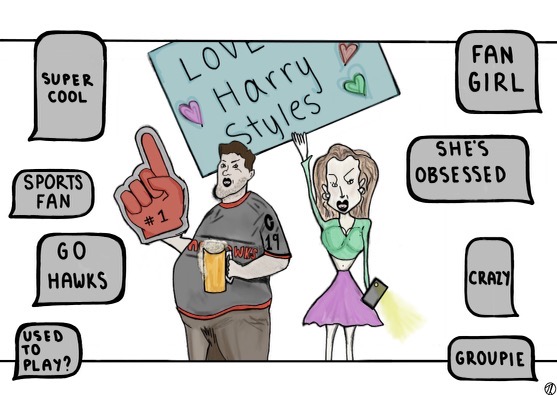Sports fans vs Fan girls: What’s the difference?
February 13, 2023
In 2021, I attended BTS’ Permission to Dance in LA concerts in late November. I visited Sofi Stadium for the first time in Inglewood, California. In Feb. of 2022, Super Bowl LVI was held in Sofi Stadium. While watching the game with my mom, I posed the question, “Who paid more for tickets, me, or the guy sitting in my exact seat right now?” My mom answered immediately telling me that some sports fans spend close to thousands on Super Bowl tickets. I was shocked, and questioned why it was seen as so weird for me to fly to LA for a concert, while other sports fans spend way more than I did on a football game. This is when I started to understand the divide and double standard between “fan girls” and sports fans.
Merriam-Webster Dictionary defines “fan girl” as “a girl or woman who is an extremely or overly enthusiastic fan of someone or something”. When referring to the term “sports fans”, usually inferring large groups of men, Merriam-Webster dictionary defines this as “an ardent admirer or enthusiast of a sport or performing art”.
In both dictionary definitions, the word “enthusiastic” is used. For fan girls, the words “overly” and “extremely” come before the adjective. This portrayal of girls and women is blatantly misogynistic and the double standard needs to be discussed.
The rise of fan girls began in 2010, when One Direction was created through the UK show The X Factor. Made up of 5 boys, One Direction was the biggest boy band since the Beatles. As a child, my love for celebrities, and many others, started with these boys. Screaming fans would get tattoos, wait outside hotels, and even hack into security footage to watch the boys. One fan even made a shrine on the side of the road where Harry Styles threw up. These instances and many others began the stereotype of insane, over-the-top teenage girls who get overly excited or too involved with a celebrity.
Sport fans have always been relevant, especially when it comes to events like March Madness, The World Cup, and the Super Bowl. For this majority male group, rioting and looting is a common reaction to wins and losses. Fans once dumped garbage in Tommy Maddox’s lawn after he played poorly in a Steelers game. Another group of Pitt fans poured urine on a West Virginia coach in 1975. After events like these, and many city riots, sports fans are labeled as “passionate” and never get the same title and stereotype as fan girls.
Both groups of people participate in the same activities. Screaming for their favorite celebrity, asking for autographs, and taking events too seriously, such as concerts or wins and losses. So why do fan girls have a different, isolating definition? When Zayn Malik left One Direction in 2015, many videos of fans crying were posted online with the description of “crazy fan crying over celebrity.” Even as a young child, I was seen as weird and too obsessed for crying over Zayn’s split from the group.
For sports, many high stake games such as the World Cup can cause intense emotions for fans. I have seen many videos of fans reacting to a win or loss, ending in tears and hugs. So what’s the difference?
Not only is this a double standard, but it also perpetuates the belittling and deprecation of women as a whole. In work places, classrooms, and everyday life, women fight to be treated as equals to men. It also promotes the ever growing stereotype of over-emotional women. Because of this, a common experience of fan girls is convincing others to take them seriously. Because of this insane label, many fan girls have been taught to be embarrassed of their likes. For music specifically, I found myself privat-ing playlists and listening history for artists like BTS or One Direction. When someone mentions a boy band, I often find myself saying, “Some of their music is actually good.” Doing this is a protection against being called a crazy fan. If I mentioned that I love all their albums and saw them in concert, people would no longer take my interest seriously.
For sports fans, watching games in class, having season tickets, and wearing merchandise are all seen as normal. Even in school, it is seen as weird to watch “fan girl content” and is often shamed for girls. But in the same way, I have seen many boys watch sports highlights in class, and no bats an eye. Overall, the double standard between fans and fan girls continues to promote misogyny and the demotion of women as a whole. It causes the media to often not trust women and their interests, and also downplays the love of a young girl enjoying something.



























